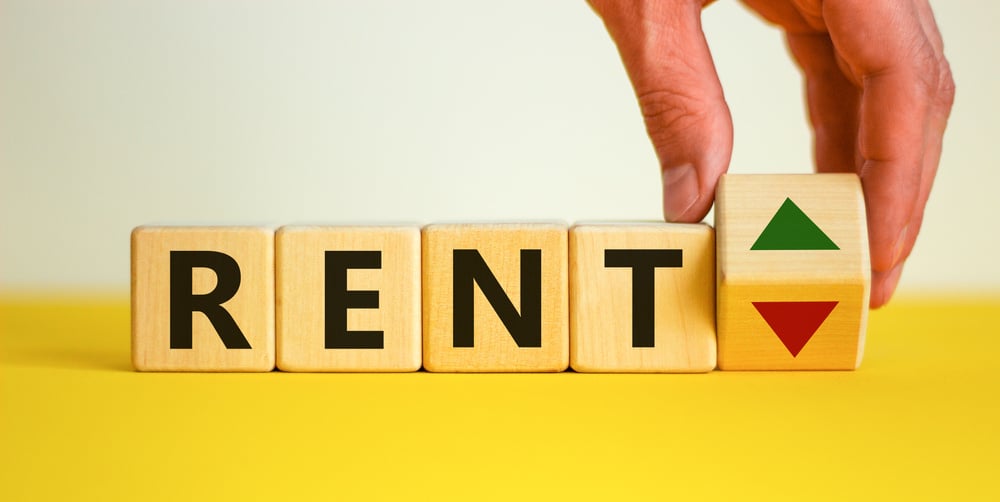
Like the cost of most goods, rent often increases over time. Some years it changes very little, and others might see a dramatic increase. But as a renter, it's important to understand who can and can't raise your rent and have a basic understanding of the laws regarding rent increases. Here's a look at whether or not a property manager can raise your rent.
Who Can Raise My Rent?
The person responsible for setting the rent price is the individual or business entity who owns the building, also known as the landlord or property owner. Today, property owners can vary from a single individual to large corporations. You may interact with your property owner regularly, or you may only know them by the name you write on the check. But whoever holds the property's title is responsible for setting the rent.
There are laws that govern how and when property owners can raise the rent. In most places, rent prices are determined by the laws of supply and demand- meaning property owners can raise the rent as much as they believe renters are willing to pay. But, in others, there are laws that keep rent increases at a rate consistent with inflation. So, it's essential to understand the local laws if you want to find out what is allowed.
Can a Property Manager Raise My Rent?
A property manager cannot decide to raise your rent on their own if they do not own the building, but they can enforce an increase in rent that the property owner approves. A property manager is an individual or company tasked with maintaining a building on the owner's behalf, and their responsibilities often include performing maintenance, collecting rent, and filling vacant units.
The property manager may also determine the rent prices, including any rent increases. But the property owner must either approve the increase or agree to let the property manager determine the rent prices on their own. Ultimately, the property manager works for the owner and can be overruled if the owner decides to make a different decision concerning rent. But in many cases, the owner will delegate key responsibilities to the property manager, such as setting rent prices, and will not interfere as long as the decision is based on market logic.
Many property owners self-manage their own properties. In this instance, they're fully within their rights to raise the rent themselves. Ultimately, whoever holds the title to the property is the one responsible for setting the rent or delegating that responsibility to someone else. So, while a property manager cannot overrule the owner's decisions, they can be put in charge of raising the rent on their behalf.
Laws Regarding Rent Raises
Property owners may raise the rent as much as they like unless the area features rent control laws. But laws exist to govern when and how owners can increase the rent.
When Can Property Owners Raise the Rent?
A property owner is only permitted to increase the rent at the end of a lease term. So, if you have a 12-month lease, the owner can only raise the rent at the end of the 12 months. They must notify you that the rent is increasing and offer you the right to renew or find other housing (unless they no longer wish to continue the relationship). But if your property owner decides to increase the rent mid-lease, you have a right to refuse to pay the additional sum or take them to court.
If you have a month-to-month lease, the property owner may raise your rent at the end of any month. But they must provide you with written notice, typically 30 days or more in advance. That's one of the downfalls of not having a long-term agreement in place.
How Does Rent Control Work?
Rent control refers to a set of laws that limit how much rent property owners can charge. These laws are common in states where real estate values are high and may become too expensive for average Americans without some form of government intervention. New York, California, New Jersey, Maryland, Washington DC, and Oregon all have rent control laws. Other states have banned rent control outright, while some simply have no laws on the books governing rent control.
In areas with rent control, property owners are usually allowed to raise the rent, but only by a small percentage to keep up with the cost of inflation. While rent control can offer a bit of relief to renters concerned about rising prices, many economists argue that rent control laws deter incentives to create better housing, leading to a decrease in the quality and quantity of rental properties. It's a controversial law but works in some areas where rent may otherwise get out of control.
Bottom line, if your lease is set to expire, you should expect an increase unless you live in a rent-controlled building. But also make sure the property owner or property manager follows the proper protocols when announcing your rent increase, including providing written notice with ample time to respond to the increase.
If you're a property manager struggling to know how and when to raise rents in your building, you may consider hiring an experienced property manager to make your life easier.










